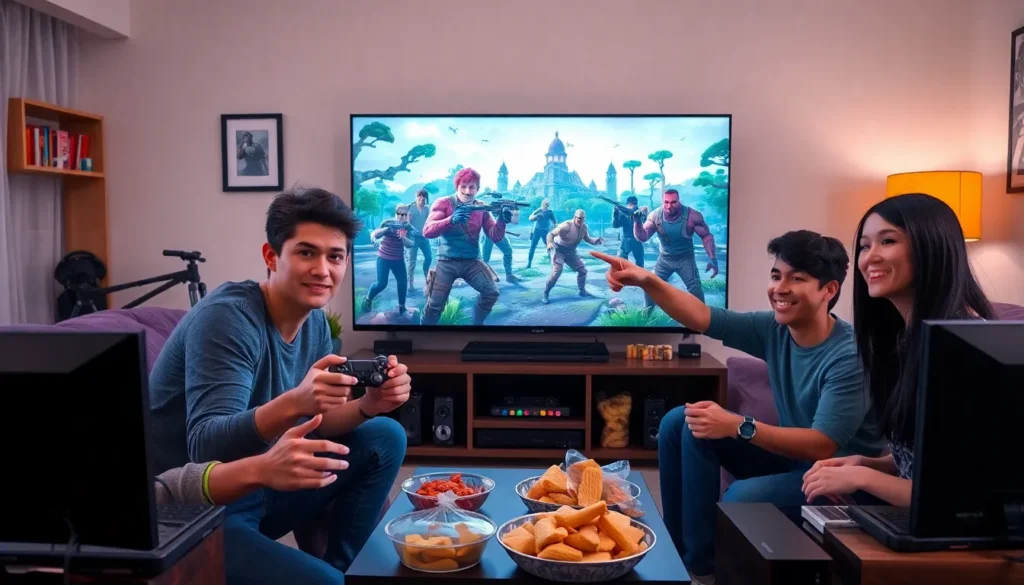In the vibrant world of League of Legends, where champions clash and strategies unfold, one trait can turn a promising game into a laughable disaster: hubris. Picture this: a player, brimming with confidence, charges into battle, convinced they’re invincible. Spoiler alert: they’re not. Hubris is the sneaky villain lurking behind many epic fails, transforming skilled players into memes faster than you can say “Pentakill.”
Table of Contents
ToggleUnderstanding Hubris in League of Legends
Hubris manifests in League of Legends when players exhibit excessive confidence, often leading to poor decision-making. Overconfidence can stem from past victories, creating a false sense of invulnerability. Players may charge into engagements, neglecting necessary strategies or team coordination. These reckless choices frequently result in unexpected defeats, impacting not only individual performance but also team morale.
Failure to recognize enemies’ abilities can compound issues. When players disregard potential threats, they become easy targets. Observing patterns from skilled players demonstrates that maintaining humility often correlates with better outcomes in matches. That humility encourages strategic play over impulsive decisions, which generally increases the likelihood of winning.
Examples abound in community discussions about infamous hubris cases. A player may dive into the enemy’s base while ignoring their health, believing that their prowess guarantees success. Such moments frequently become the highlights of community memes, serving as cautionary tales for others. Learning from these events can promote growth and shared understanding among players.
Recognizing hubris acts as a pivotal moment for improvement. Assessing one’s performance critically, rather than solely celebrating achievements, opens pathways for growth. Gathering feedback from teammates can also provide valuable insights. Therefore, developing a mindset that values collaboration and openness leads to more balanced gameplay, reducing the chances of falling victim to one’s hubris.
Causes of Hubris Among Players

Hubris among players often stems from various interrelated factors. Understanding these causes can aid in recognizing and mitigating overconfidence.
Overconfidence in Skill Level
Overconfidence frequently emerges after a string of victories. Players who dominate matches may develop an inflated perception of their capabilities. This belief can lead them to underestimate opponents’ skills, creating a false sense of invincibility. Consequently, they often engage in aggressive plays without considering potential risks. This behavior can hinder team dynamics, as these players may neglect essential strategies. Realizing that skill level varies between games is crucial. Acknowledging the possibility of defeat fosters a more balanced perspective that counters hubris.
Poor Decision-Making
Poor decision-making often follows an inflated self-image. Players may take unnecessary risks, such as diving into fights when outnumbered or ignoring crucial team calls. Impulsive actions stemming from overconfidence can result in heavy losses. Ignoring map awareness or enemy positioning leads to severe consequences for both individual and team performance. Misjudgments commonly arise during critical moments in matches. Emphasizing humility and thoughtful choices promotes better gameplay. Prioritizing teamwork over solo plays mitigates the effects of hubris, fostering a collaborative environment essential for success.
The Impact of Hubris on Performance
Hubris significantly affects player performance in League of Legends. Overconfidence often leads players to ignore crucial gameplay strategies and their opponents’ capabilities.
Individual Player Performance
Excessive confidence can overshadow a player’s true skill level. Ignoring enemy abilities creates vulnerability. Players may engage in aggressive plays exacerbating their downfall. They often take unnecessary risks that result in detrimental consequences. Poor decision-making frequently emerges as a result of inflated self-image. Developing humility fosters better gameplay outcomes while encouraging strategic thinking. Critical self-assessment becomes essential for growth, promoting a continual learning mindset. Engaging with teammates for feedback enhances clarity in judgment and reduces impulsive actions. Ultimately, recognizing personal limits aids in minimizing hubris-related failures.
Team Dynamics
Hubris disrupts team cohesion and overall dynamics. Confident players may overlook teamwork, focusing instead on individual glory. This behavior can lead to miscommunication and unmet expectations among teammates. When players underestimate their opponents, they’re more likely to reject strategic calls. Consequently, conflicts arise, causing team morale to plummet. Collaboration thrives when each member accepts constructive criticism. Prioritizing communication establishes a unified approach for success. Building synergy becomes easier when humility guides decision-making. Teams create favorable conditions that foster sustainable gameplay without the negative influence of hubris.
Strategies to Overcome Hubris
Recognizing and addressing hubris can significantly improve gameplay in League of Legends. Implementing self-reflection and seeking constructive feedback from teammates serves as effective strategies.
Self-Reflection Techniques
Players benefit from regular self-assessment after matches. Examining decisions, such as aggressive plays or missed opportunities, sheds light on patterns of hubris. Journaling about gameplay experiences fosters deeper understanding of personal performance. Identifying triggers that lead to overconfidence enhances awareness of risk factors. Adopting a fixed mindset allows players to embrace learning rather than focusing solely on victories. Taking a moment to analyze high and low moments helps players develop resilience and clarity. Balancing confidence with humility creates a more reflective, strategic mindset.
Seeking Constructive Feedback
Constructive feedback provides players with perspectives on their gameplay that they might overlook. Team discussions after games create opportunities for open dialogue. Encouraging teammates to share their observations fosters a culture of teamwork. Asking direct questions about specific plays invites valuable insights. Listening actively allows players to address their gameplay weaknesses effectively. Establishing a feedback loop promotes continuous improvement. Building a rapport with teammates enhances trust and communication, essential for effective teamwork. Prioritizing collective growth leads to better team dynamics and reduced instances of hubris in matches.
Hubris in League of Legends serves as a cautionary tale for players at all levels. Overconfidence can derail even the most skilled individuals and disrupt team dynamics. By recognizing the signs of hubris and embracing humility, players can foster a more collaborative environment that prioritizes strategy over reckless plays.
Self-reflection and open communication are essential tools for overcoming the pitfalls of hubris. By seeking feedback and engaging in constructive discussions, players can enhance their gameplay and contribute positively to their teams. Ultimately, the key to success lies in balancing confidence with awareness, ensuring that victories are achieved through teamwork and strategic thinking rather than individual bravado.








